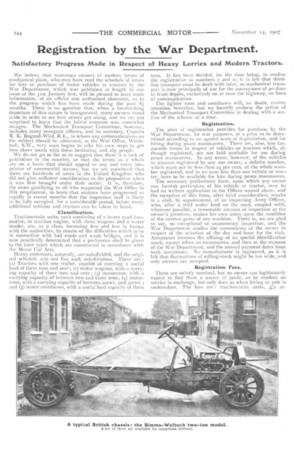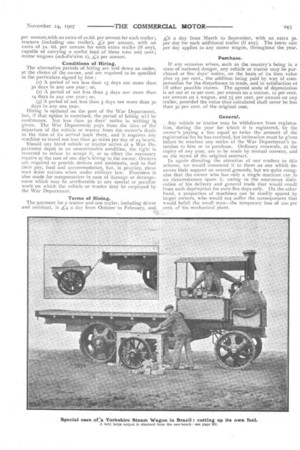Registration by the War Department.
Page 4

Page 5

If you've noticed an error in this article please click here to report it so we can fix it.
Satisfactory Progress Made in Respect of Heavy Lorries and Modern Tractors.
We believe. that numerous owners of modern forms of mechanical plant, who may have read the schedule of terms for hire or, purchase of motor vehicles or tractors by the War Department, which was published at length in our issue of the 31st January last,, will be pleased to have sonic information, of an official and authorised character, as to the progress which has been made during the past 84 months. There is no queStion. that, when a far-reaching departure of this nature is inaugurated, many owners stand aside in order to see how others get along, and we are not surprised to learn that the initial response was somewhat meagre. The Mechanical Transport Committee, however, includes many energetic officers, and its secretary, Captain R. K. Bagnall-Wild, R.E., to whom any communications on the subject should be addressed, at the War Office, Whitehall, SW., very soon began to take his own Steps to get into closer touch with these hesitating and shy people. We do not go so far as to suggest that there is a lack of patriotism in the countiy, or that the terms as a whole are on a basis that Should appeal to any and every proprietor of commercial motors, but we are convinced that there are hundreds of users in the -United Kingdom who did not give sufficient consideration to the proposition when it was first brought under their notice. It is, therefore, the more gratifying to all who supported the War Office in this programme, to learn that matters have progressed so rapidly in recent months that the inspection staff is likely to be fully occupied, for a considerable period, before many additional vehicles and tractors can be taken in hand.
Classification.
Traction-train units, each consisting of a heavy road locomotive, or traction engine, with three wagons and a water tender, are, as a class, becoming less and less in favour with the authorities, by reason of the difficulties which arise in connection with bad roads and meak bridges, and it is now practically determined that a preference shall he given to the later types which are constructed in accordance with the Motor Car Acts.
Heavy motorcars, naturally, are sub-divided, and the original schedule sets out .five such sub-divisions, These are : (I) Tractors with one trailer, capable of carrying a useful load of three tons and over; (2) motor wagons, with a carrying capacity of three tons and over; (3) motorvans, with a carrying capacity of between two and three tons; (4) motorvans, with a carrying capacity of between 2ocwt. and ocwt. ; and (5) motor omnibuses, with a useful load capacity of three tons. It has heti, decided, for the time being, to confine the registration to numbers i and 2 ; it is felt that thirdline transport must be dealt with later, as mechanical transport is now principally of use for the conveyance of produce to front depots, exclusively on or near the highway, on lines of communication.
The lighter vans and omnibuses will, no doubt, receive attention hereafter, but we heartily endorse the action of the Mechanical Transport Committee in dealing with a section of the scheme at a time.
Registration.
The plan of registration provides for purchase by the War Department, for war purposes, at a price to be determined according to an agreed scale of depreciation, and for hiring during peace manceuvres. There are, also, less favourable terms in respect of vehicles or tractors which, although registered, are not held available for use during peace manceuvres. In any event, however, of the vehicles or tractors registered by any one owner, a definite number, which must not be less than 25 per cent, of the whole number registered, and in no case less than one vehicle or tractor, have to be available for hire during peace manceuvres.
The necessary preliminary form, upon Which any owner can furnish particulars of his vehicle or tractor, may be had on written application to the Officer named above, and the reception of this form, after brief consideration, results in a visit, by appointment, of an inspectingArmy Officer, who, after a trial under load on the road, ooupled with, wherever possible, a reasonable amount of inspection at the owner's premises, makes his own notes upon the condition of the varioos parts of any machine, There is, we are glad to say, no exceptional or unnecessary inspection, and the War Department studies the convenience of the owner in
• respect of the selection of the day and hour for the visit. Acceptance involves the affixing of no special identification mark, except when on manceuvres, and then at the expense of the War Department, and the annual payment dates from such acceptance. No manufacturer is registered, as it is felt that fluctuations of rolling-stock might be too wide, and only owners are accepted.
Registration Fees.
These are strictly nominal, but no owner call legitimately expect to find them a source of profit, as he renders no service in exchange, but only does so when hiring or sale is undertaken. The fees are traction-train t ra.n units, -1,2 25.
per annum,with an extra of 29.6d. per annum for each trailer ; tractors (including one trailer), £2 per annum, with an extra of 2S. 6(1. per annum for each extra trailer (if any), capable of carrying a useful load of three tons and over; motor wagons (sub-division 2), £2 per annum.
Conditions of Hiring. The alternative periods of hiring are laid down as under, at the choice of the owner, and are required to be specified in the particulars signed by him :
• (t) A period of not less than is days nor more than 30 days in any one year ; or, (2) A period of not less than 5 days nor more than 14 days in any one year ; or,
(3) A period of not less than 5 days nor more than 30 days in any one year.
Hiring is optional on the part of the War Department, but, if that option is exercised, the period of hiring wi.1 be continuous. Not less than 30 days' notice in writing is given. The War Department pays from the time of the departure of the vehicle or tractor from the owner's depot to the time of its arrival back there, and it requires any machine to travel not loss than 40 miles per day of 24 ly711rs,
Should any hired vehicle or tractor arrive at a War Department depOt in an unserviceable condition, the right is reserved to refuse to accept it, or to effect the necessary repairs at the cost of one day's hiring to the owner. Owners are required to provide drivers and assistants, and to find their pay, food and accommodation, but, in practice, these men draw rations when under military law. Provision is also made for compensation in case of damage or derangement which may be attributable to any special or peculiar work on which the vehicle or tractor may be employed by the War Department.
Terms of Hiring.
The payment for a tractor and one trailer, including driver
and assistant, is a day from October to February, and j.;"6 a day from March to September, with an extra 5s. per day for each additional trailer (if any). The lower rate per day applies to any motor wagon, throughout the year.
Purchase.
If any occasion arises, such as the country's being in a state of national danger, any vehicle or tractor may be purchased at five days' notice, on the basis of its then value plus 25 per cent., the addition being paid by way of compensation for the disturbance to trade, and in satisfaction of all other possible claims. The agreed scale of depreciation is set out at to per cent. per annum on a tractor, 12 per cent. nor annum on a wagon, and 7A per cent, per annum on any trailer, provided the value thus calculated shall never be less than 30 per cent, of the original cost.
Genera/.
Any vehicle or tractor may be withdrawn from registration, during the year for which it is registered, by the owner's paying a fine equal to twice the amount of the registration fee he has received, but intimation must be given before he receives any notice of the War Department's intention to hire or to purchase. Ordinary renewals, at the expiry of any year, are to be made by mutual consent, and on the terms of the original contract.
In again directing the attention of our readers to this scheme, we would commend it to them as one which deserves their support on several grounds, but we quite recognise that the owner who has only a single machine can in no circumstances spare it, owing to the enormous dislocation of his delivery and general trade that would result from such deprivation for even five days only. On the other hand, a proportion of machines can be readily spared by larger owners, who would not suffer the consequences that would befall the small man—the temporary loss of too per cent, of his mechanical plant.






















